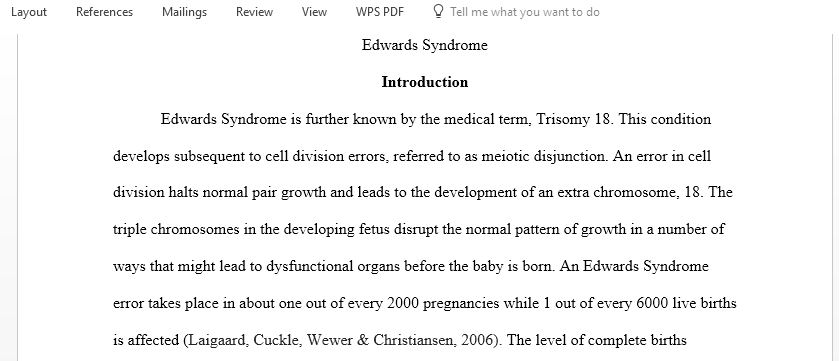Assess the etiological, prognostic and diagnostic Edward syndrome characteristics
Annotated Bibliography – Edwards Syndrome or Trisomy (18). Rosa, R. F. M., Rosa, R. C. M., Zen, P. R. G., Graziadio, C., & Paskulin, G. A. (2013). Trisomy 18: a review of the clinical, etiologic, prognostic, and ethical aspects. Revista Paulista de Pediatria, 31(1), 111-120.
The objective of this journal is to assess the etiological, prognostic and diagnostic Edward syndrome characteristics. The authors’ sources of data were from Lilacs and Medline sources. It will help me describe the disease with the effects of these descriptions to body organs. Also, it will help in impacting knowledge on the prognosis and clinical picture of trisomy 18 in regards to the invasive treatments’ decisions and neonatal care. Besides, it is a primary source that will help me construct an augmentative paper educates the reader on interventions that are usually conducted under conditions of emergency without numerous discussion opportunities involving difficult ethical and medical issues.
Gupta, J. K., Farrell, T. A., Hau, C. M., Cave, M., Lilford, R. J., Irving, H. C., & Mason, G. (1995). Clinical significance of fetal choroid plexus cysts. The Lancet, 346(8977), 724-729.
The article first offers a description of Edward syndrome and then goes ahead to give the statistics of the prevalence of the syndrome of the new born and also the risk of recurrence. The article will help me draw a conclusion that the syndrome comes with a lot of dilemmas whose solution is difficult to find. It will also enable me to recommend the use of more quantitative data on the families’ experience. The voice of the authors is extremely important even though they are reflecting one facet of the whole portrait. The journal will help me in developing a constant dialogue and are also welcoming other professionals of health on this issue. The article is important since it still demonstrates that it is willing to extend its research through the authors’ involvement in dialogues.
Wu, J., Springett, A., & Morris, J. K. (2013). Survival of trisomy 18 (Edwards syndrome) and trisomy 13 (Patau Syndrome) in England and Wales: 2004–2011. American Journal of Medical Genetics Part A, 161(10), 2512-2518.
The purpose of this journal article is to determine the live births’ survival with Edwards syndrome and the variant. This article is significant to my research as it links the information on live births with the Edwards syndrome in the NDSCR to the NHS center of information to attain information regarding survival. It will help present the statistics of the survival rate of the syndrome in Wales and England between the period of 2011 and 2004. The article is based on the largest data conducted on survival for live births with Edward syndrome. Therefore, through the article, I will present my audience with the knowledge capacity regarding the survival rate of these infants is enhanced. Further, these rates of survival can be used during counseling.
McCandless, S. E., Brunger, J. W., & Cassidy, S. B. (2004). The burden of genetic disease on inpatient care in a children’s hospital. The American Journal of Human Genetics, 74(1), 121-127.
The journal is mainly interested in the treatment of genetic disorders. The research is primarily focused on inborn error’s management of metabolism and the trisomy 18 syndrome. The article is an important source since it pays special attention to the developing protocols for the management of infants with disorders of fatty acid oxidation that are diagnosed by newborn screening and outcomes in the long run. The article will help me define the actual impact in the genetics’ role in pediatric illness has not been effectively delineated despite being increasingly acknowledged. The article will also help me to quantify the huge impact of this genetic disease on both the system of healthcare and the inpatient’s pediatrics.
NHS (2017). Edward’s Syndrome (trisomy 18). Retrieved from: https://www.nhs.uk/conditions/edwards-syndrome/Pages/Introduction.aspx
Edward’s Syndrome is also an important source to my research. This article by NHS will help me present a description essay of Edward syndrome, its minimum survival rates and the likelihood of having severe mental and physical disabilities in any case they survive. The article also will help me cover symptoms, the cause of Edward’s syndrome, treatment, and information about children. On the other hand, this article is significant since it’s both informative and details Edward Syndrome. It will help me present a descriptive essay to my audience from health professionals to parents to utilize it in diagnosis and counseling.
Answer preview for Assess the etiological, prognostic and diagnostic Edward syndrome characteristics
Access the full answer containing 2760 words by clicking the below purchase button

